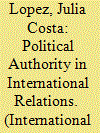| Srl | Item |
| 1 |
ID:
154173


|
|
|
|
|
| Summary/Abstract |
There is a wealth of literature on the Western perspective of the Crusades. The subject has crossed academic disciplines because of the availability of the literature in the modern world. That does not necessarily mean that what has been said about the Crusades is completely correct. Moreover, little attention is given to the side against which the Crusades were launched in the Middle Ages, and not much has been written on the Muslim responses to the Crusades. The recent past, however, has produced some interesting research on the medieval Muslim perspective and understanding of the Crusades and Crusaders, as seen and recorded by the Muslim scholars of that period. This essay explores and surveys the existing literature on the Muslim responses to the Crusades.
|
|
|
|
|
|
|
|
|
|
|
|
|
|
|
|
| 2 |
ID:
172842


|
|
|
|
|
| Summary/Abstract |
In international relations, accounts of medieval political authority are divided between those who see a heteronomous patchwork of overlapping authorities and those who claim that the era of the state started in the twelfth century. How can we overcome this divide? I argue that IR's current difficulties in grasping the nature of medieval political authority stem from shortcomings in how the notion of political authority itself has been conceptualized. Thus, rather than starting from a substantive definition of political authority, I focus on contestation over the categorization and authorization of rule, that is, on how authority is produced in historically specific ways as a result of contemporary contestation over what political authority is, who is authorized, and how rulers stand in relation to one another. This reorientation allows us to appreciate how medieval political authority emerged from the competition between four sets of ordering categories: iurisdictio, potestas, lord/vassal, and magistrate. Each one of these four categories understood authority, rulers, and the relation between rulers in different ways. The problem with existing accounts of medieval authority is that they attempt to find the single ordering principle of medieval international relations. In doing so, they not only fail to capture the features of the time but also reinforce a particular approach to political authority that is unhelpful for understanding medieval and modern politics alike.
|
|
|
|
|
|
|
|
|
|
|
|
|
|
|
|